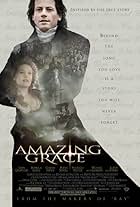Six intertwining stories showcase the social impact of soccer across the world.Six intertwining stories showcase the social impact of soccer across the world.Six intertwining stories showcase the social impact of soccer across the world.
- Director
Photos
Storyline
Featured review
The overlying theme of Michael Apted's 2007 documentary, about the sport that is football and how it links everyone, is highlighted fairly subconsciously; naturally and one would assume, totally unplanned, in the gradual progression from one team or nation the piece predominantly follows before advancing from it to another. For instance, we begin the documentary in South Africa, late 2005 and their national team are about to take on the Ghanaians in a vital match that will see one qualify and one eliminated. The importance of the match is verbally highlighted by an African football official whom details the African process of narrowing so many teams down to just a bunch. The South Africans lose, two goals to nil; but the important thing about this is that much later on in the tournament proper, after we've swung from another country, and their fans, to another; Ghana will crop up again in a must-win match only this time against those from The United States of America. You see, it might so easily have been the South Africans, and if it had been then two of the featured sets of supporters of whom we'd have spent almost a fifth of the film's runtime with would've come together for that match. The point seems to be that football is intrinsic, and through one thing or another, if you chart the games all the way back, you can figure that each nation; match and supporter are linked together.
The documentary is entitled The Power of the Game, but it is not about individual matches nor a documentary on football as a whole in its rules and historic roots, rather it uses the above mentioned finals tournament of the 2006 World Cup in Germany as a source in which to explore what football means to those that play it; watch it; report on it; celebrate it and ultimately love it. Nor is this indeed a documentary of said tournament; this is not a story of The 2006 World Cup, more-so a tale of those behind it in officials, players, managers, journalists and fans – each of them varying roles from various nations with various stories as to how they got to be where they are but ultimately brought together through the sport of football.
Director Michael Apted flits from one nation or nationality to another, the very opening is a montage of various people from various countries and cultures ranging from The States to South Africa right the way through to Iran. There's a running sense of covering people that are new to the game: the South African's, whose reintroduction to the sport in 1994 saw decades of banishment by FIFA due to Apartheid rule evaporate; the American's, whose footballing culture is documented as being anything but grossly populist when compared to big name stars in other American sports and whose main supporter's group, named Sam's Army, was only really established in the mid 1990s; and the Iranian's, whose tale involves gender, equal rights and politics when the battling of the state's tolerance as to whether women are allowed to engage in watching, playing and documenting football is allowed.
So there's this sense of football helping banish feelings of racial hatred; break down the walls in gender inequality and aid in opening up the minds of people of a specific, set culture with its own closed off world of sport to new means of sporting entertainment. This, along with the documenting of football as an item that saves, or offers hope and aspiration where previously there was none in the Argentinian and Senegalese footballing academies; two nations on two separate continents with varying histories and cultures but linked through poverty and the sport of football. Apted revolves his documentary around nations, with the greatest of respect, that were perhaps never predestined to do all that well in the finals tournament of The 2006 World Cup. In sidestepping the likes of England; France; Italy or even hosts Germany for the likes of Iran and America, Apted has gone on to capture that while these teams suffer the process of painful, early elimination; it's the joy in the experiencing football as one with everyone else and the magnificence in the taking part of the biggest event in the world in the sport that we come to learn, through this, links us all.
I came away rather humbled by the piece, I saw mostly every game of the said World Cup during its broadcast and through what the documentary made aware, I only then spied the "Sam's Army" flag draped over the edge of a terrace for the first time when the piece would replay an American goal from a vital match. Maybe I did see it when I saw the match live, but there's no way I would've known what or whom it alluded to. On another strand, the national women's team of Iran is detailed by a female Iranian journalist named Mahin Gorji; I looked them up: seems they were involved quite recently in a World Cup campaign of their own, in which they were walloped 8-1 by the women from Thailand. Shame. Apted looks at racism in the game, curiously and tactfully cutting to a Muslimified borough in London, England after introducing the topic before exploring how a certain British-born of Pakistani descent footballer was helped in ignoring traditional Muslim ways of life by his father; later going on to play for both the Pakistani national team (in a handy 0-0 draw with then-Asian champions Iraq) and in the English Premier League. Few pieces that I've seen have come across as competent in capturing what it is football means to so many people as The Power of the Game, spreading itself across a number of people from a number of nations and additionally whisking the viewer through a number of different emotions ranging from nostalgia to joy to affection.
The documentary is entitled The Power of the Game, but it is not about individual matches nor a documentary on football as a whole in its rules and historic roots, rather it uses the above mentioned finals tournament of the 2006 World Cup in Germany as a source in which to explore what football means to those that play it; watch it; report on it; celebrate it and ultimately love it. Nor is this indeed a documentary of said tournament; this is not a story of The 2006 World Cup, more-so a tale of those behind it in officials, players, managers, journalists and fans – each of them varying roles from various nations with various stories as to how they got to be where they are but ultimately brought together through the sport of football.
Director Michael Apted flits from one nation or nationality to another, the very opening is a montage of various people from various countries and cultures ranging from The States to South Africa right the way through to Iran. There's a running sense of covering people that are new to the game: the South African's, whose reintroduction to the sport in 1994 saw decades of banishment by FIFA due to Apartheid rule evaporate; the American's, whose footballing culture is documented as being anything but grossly populist when compared to big name stars in other American sports and whose main supporter's group, named Sam's Army, was only really established in the mid 1990s; and the Iranian's, whose tale involves gender, equal rights and politics when the battling of the state's tolerance as to whether women are allowed to engage in watching, playing and documenting football is allowed.
So there's this sense of football helping banish feelings of racial hatred; break down the walls in gender inequality and aid in opening up the minds of people of a specific, set culture with its own closed off world of sport to new means of sporting entertainment. This, along with the documenting of football as an item that saves, or offers hope and aspiration where previously there was none in the Argentinian and Senegalese footballing academies; two nations on two separate continents with varying histories and cultures but linked through poverty and the sport of football. Apted revolves his documentary around nations, with the greatest of respect, that were perhaps never predestined to do all that well in the finals tournament of The 2006 World Cup. In sidestepping the likes of England; France; Italy or even hosts Germany for the likes of Iran and America, Apted has gone on to capture that while these teams suffer the process of painful, early elimination; it's the joy in the experiencing football as one with everyone else and the magnificence in the taking part of the biggest event in the world in the sport that we come to learn, through this, links us all.
I came away rather humbled by the piece, I saw mostly every game of the said World Cup during its broadcast and through what the documentary made aware, I only then spied the "Sam's Army" flag draped over the edge of a terrace for the first time when the piece would replay an American goal from a vital match. Maybe I did see it when I saw the match live, but there's no way I would've known what or whom it alluded to. On another strand, the national women's team of Iran is detailed by a female Iranian journalist named Mahin Gorji; I looked them up: seems they were involved quite recently in a World Cup campaign of their own, in which they were walloped 8-1 by the women from Thailand. Shame. Apted looks at racism in the game, curiously and tactfully cutting to a Muslimified borough in London, England after introducing the topic before exploring how a certain British-born of Pakistani descent footballer was helped in ignoring traditional Muslim ways of life by his father; later going on to play for both the Pakistani national team (in a handy 0-0 draw with then-Asian champions Iraq) and in the English Premier League. Few pieces that I've seen have come across as competent in capturing what it is football means to so many people as The Power of the Game, spreading itself across a number of people from a number of nations and additionally whisking the viewer through a number of different emotions ranging from nostalgia to joy to affection.
- johnnyboyz
- Jun 3, 2010
- Permalink
Details
Box office
- Budget
- $2,500,000 (estimated)
- Runtime1 hour 40 minutes
- Color
- Sound mix
Contribute to this page
Suggest an edit or add missing content

Top Gap
By what name was The Power of the Game (2007) officially released in Canada in English?
Answer










